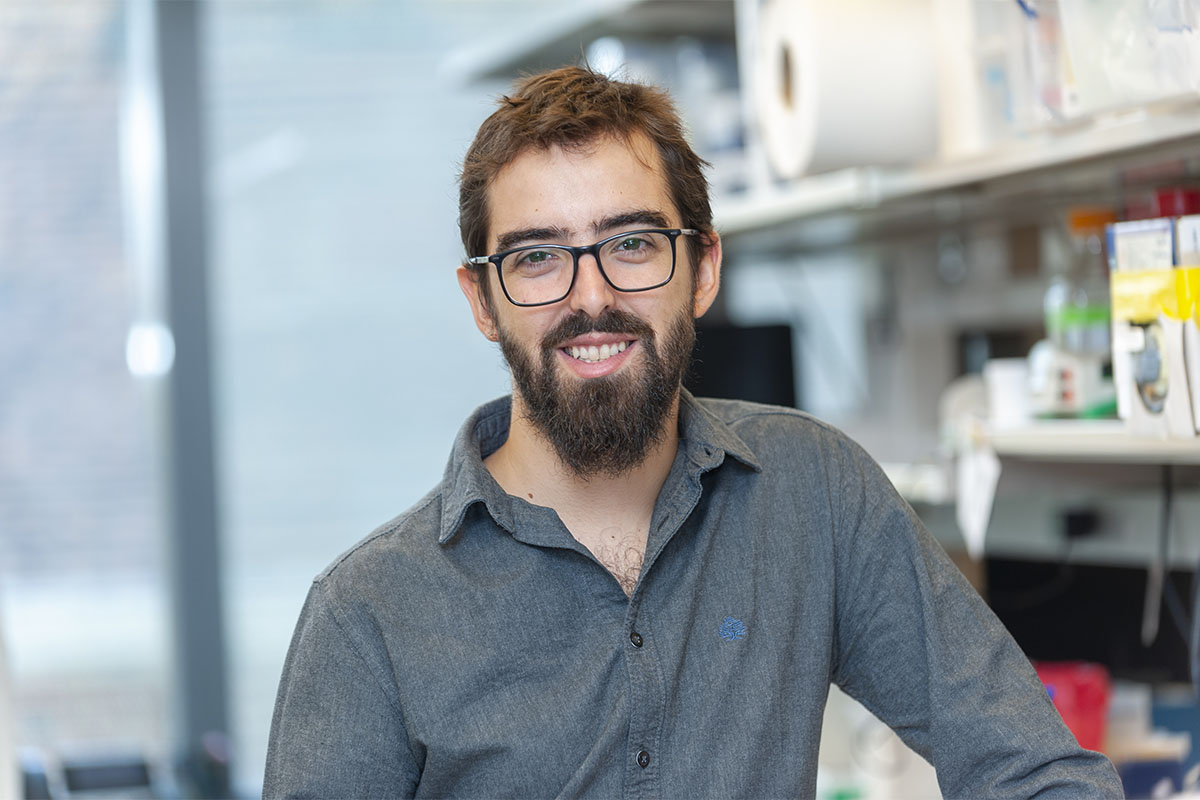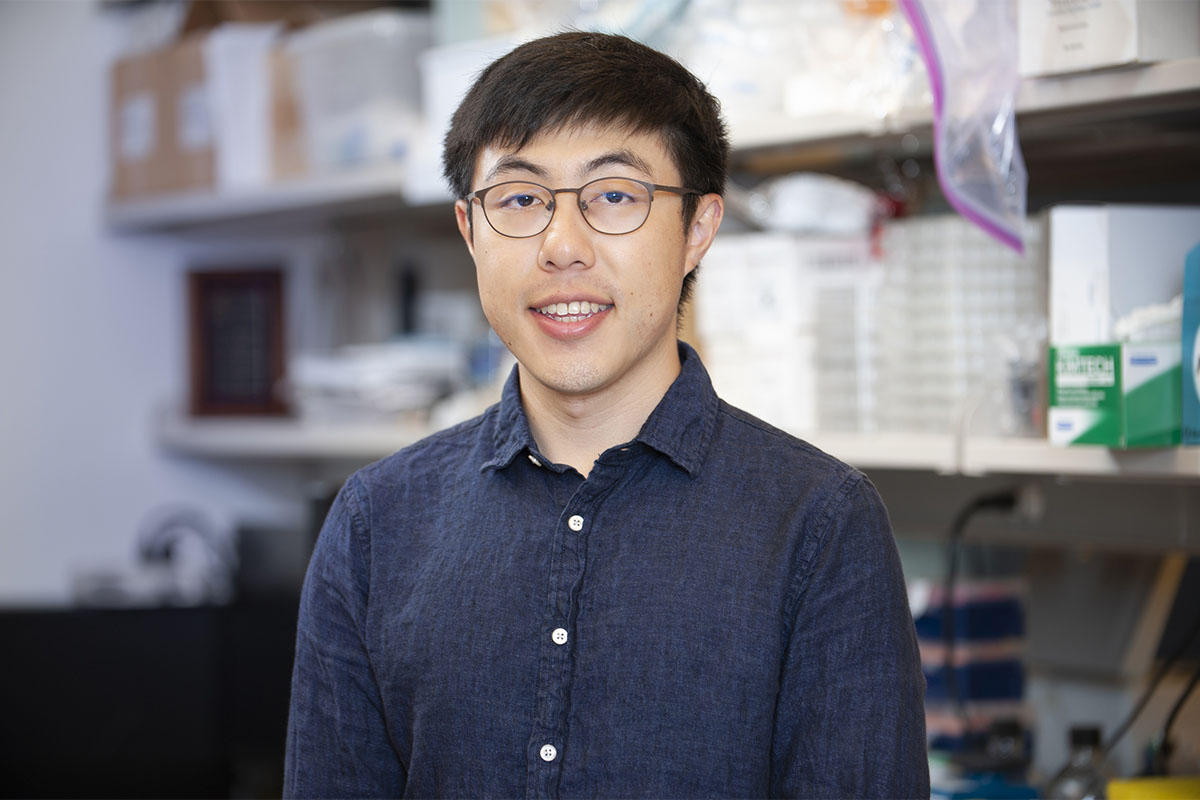
Miklos Lengyel
Lab: Niethammer
Project: Deciphering the role of oxo-eicosanoid signaling in intestinal inflammation and bowel cancer
Environmental factors leading to chronic inflammation of the gastrointestinal tract such as a high-fat diet are well-known risk factors for tumor development in the intestines. Arachidonic acid is a fatty acid found in the human diet. Chemical derivatives of arachidonic acid play important roles in in inflammation. 5-oxo-eicosatetraenoic acid (5-oxo-ETE) is one of these molecules. This molecule is almost completely unstudied because rodents do not have OXER1, the receptor of 5-oxo-ETE. I have found that loss of OXER1 in zebrafish leads to chronic intestinal inflammation due to increased gut barrier damage. My research will use zebrafish and human tissue models to understand this new protective effect of OXER1, with the goal of developing new strategies to increase the resilience of the intestinal barrier.

Lab: Balachandran
Project: Identification of Mal as a novel immune suppressor in pancreatic cancer
By studying an extraordinary cohort of long-term survivors of pancreatic cancer we identified the myelin and lymphocyte protein (MAL) as a potential novel molecule that inhibits immune responses. This project will study how MAL suppresses immune responses in pancreatic cancer, to potentially target MAL in new immunotherapies.

Winston Yun-Han Chang
Lab: Hanash
Project: Investigating interferon gamma-mediated epithelial regeneration as a pathologic mechanism of colorectal cancer
growth
My research focuses on interferon gamma and its ability to induce intestinal stem cell proliferation. I am investigating this mechanism’s contribution to intestinal epithelial regeneration in response to tissue damage during bacterial infection, and how this mechanism is commandeered to support colorectal cancer growth. These studies will be insightful towards understanding bacterial infection as a risk factor for colorectal cancer development and strategies by which colorectal cancer can resist anti-tumor immunity.

Lab: Vardhana
Project: Exploring translational dysregulation as a driver of T-cell exhaustion.
T-cells, which are immune cells that play an essential role in anti-tumor defense, exhibit decreased production of anti-tumor molecules within tumors over time. In this proposal, I hypothesize that the imbalance of nutrient supply and demand underlies as a roadblock for T-cell anti-tumor activity. The results of this proposal will provide insights on the synergy between establishing nutrient balance and immunotherapy to improve T-cell activity against cancer.

Lab: Greenbaum
Project: Deep Learning model of T-Cell recognition of antigens and its applications in cancer to inform immunotherapy design and predict response
Olga’s research applies modern computational methods and leverages large public datasets to tackle the unsolved problem of T-cell specificity: which T-cells recognize which antigens. The model elucidated antigen-specific recognition motifs in T-cell receptor (TCR) sequences for SARS-CoV2 Spike antigens, enabled tracking clinically relevant TCRs in patient repertoires during COVID-19 infection, and is evaluated for predicting vaccine-specific TCRs in responders to the pancreatic ductal adenocarcinoma vaccine. Model predictions can be applied in the cancer setting to inform T-cell selection for adoptive cell therapies, predict and track T-cell response to cancer immunotherapy and vaccines.

Lab: Hohl
Project: Murine coronavirus infection exacerbates pulmonary fungal disease
The COVID-19 pandemic has highlighted the infectious morbidity and mortality associated with co-infections with coronaviruses and invasive molds, even in apparently immune competent individuals. These observations suggest that the induction of an antiviral immune response occurs at the cost of an effective antifungal response. To investigate how mounting a distinct immune response to a secondary pathogen infection can be deleterious to the host, I have established a co-infection model that facilitates a deep mechanistic dissection of antifungal immunity in the context of pulmonary infection with a murine coronavirus.

Alexander Settle
Lab: Huse
Project: Exploring the importance of mechanosensing in antibody-dependent cellular phagocytosis
Phagocytosis, the process by which immune cells engulf and destroy pathogens and cancer, is sensitive to the mechanical properties of the target. Specifically, macrophages efficiently engulf rigid cargo but are less effective at engulfing soft material such as cancer cells. My work focuses on the mechanism by which macrophages preferentially destroy rigid targets to understand how to engineer macrophages to enhance phagocytosis of soft cancer cells.

Yanyang Chen
Lab: Maciejowski
Project: Barrier to autointegration factor (BANF1) is a critical regulator of TREX1 recruitment to ruptured micronuclei
Chromosomally instability in cancers frequently lead to cytosolic DNA, which can trigger cGAS-STING innate immune pathway and alert the immune system. My project investigates how cancer cells silence the innate immune activation by processing DNA in aberrant nuclear compartments turned micronuclei. Understanding the enzymatic degradation of micronuclear DNA can provide therapeutic targets to boost immunotherapy response of cancers by exploiting their genomic instability.

Dasom Kim
Lab: Diehl
Project: Regulation of T cell responses against intestinal microbes
In the human body, dynamic interactions between the host and microbiota shape the development and responsiveness of the host immune system, allowing for the induction of protective immunity against pathogens while also limiting aberrant responses against the microbiota. My project seeks to understand how inflammatory T cell responses against the microbiota are restrained during homeostasis and disease state. Understanding the regulatory mechanism will allow us to develop novel ways to limit intestinal inflammation and protect from chronic inflammatory diseases such as IBD or cancer.

Evelyn Minh Nguyen
Lab: Rudin
Project: Investigating mechanisms of antigen presentation deficiency in lung cancers
MHC-I-peptide antigen presentation by tumor cells is required for efficacy and durability of T cell-based immunotherapies but is often downregulated in solid tumors. My work focuses on dissecting the tumor-intrinsic drivers of antigen presentation deficiency in lung cancers, with the goal of elucidating therapeutic opportunities for immunotherapy resistance. I have performed a “druggable” genome CRISPR screen to identify novel negative regulators of MHC-I presentation and will leverage our group’s existing library of patient samples and PDX to substantiate our understanding of this fundamental mechanism.

Sayyed Hamed Shahoei
Lab: Massagué
Project: A Novel Niche-labeling Approach for Studying Tumor-Immune Interface in Metastasis
The majority of cancer-associated mortalities are due to metastatic relapse. Given the pivotal role immune cells play throughout the progression of the disease, using state-of-the-art labeling techniques, this project aims to illuminate the role of primary tumor immune stroma in metastatic dissemination, an area that holds therapeutic promise in suppressing metastatic relapse.

Mohita Malay Tagore
Lab: White
Project: Identification and targeting of macrophage/melanocyte interactions in melanoma
Effective communication between transformed cancer cells and the healthy microenvironment plays an essential role in tumor development. Macrophages are one of the most abundant cell types in the melanoma immune microenvironment, yet, identification and targeting of tumor/macrophage interactions have been challenging. In this study, using a genetic reporter system in a zebrafish melanoma model as well as human tissues, we identify regulators of cell-cell interactions between melanoma cells and macrophages resulting in new therapeutic maneuvers to target the melanoma immune microenvironment.

Jing Zhang
Lab: Li
Project: Targeting Tumor Resident Cytotoxic Innate Lymphocytes for Immunotherapy in Chromophobe Renal Cell Carcinoma
Malignancy can be suppressed by the immune system in a process termed cancer immunosurveillance, with T cell response being the most widely studied modality. Recently, we discovered a novel innate lymphocyte response in both human and murine cancers, which is functional regulated by interleukin-15. I’m interested in determining the lineage commitment of these tumor-resident cytotoxic innate lymphocytes and developing new strategies to target them for therapy.